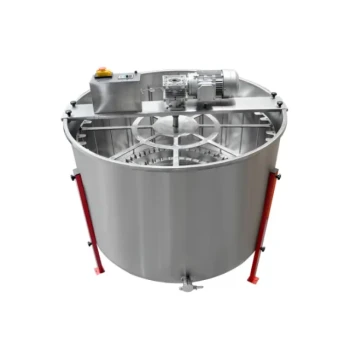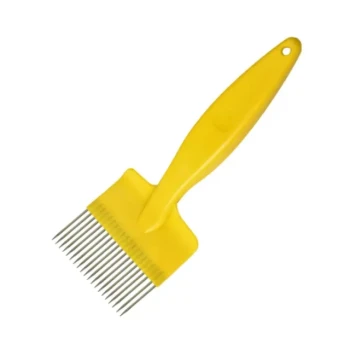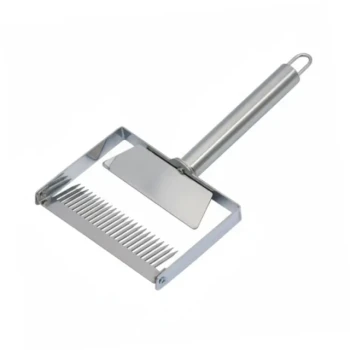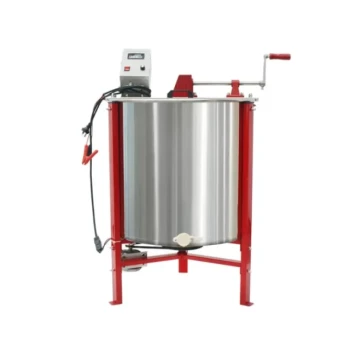At its core, collecting honey from your own hive involves three main stages: removing the honey-filled frames from the hive, separating the liquid honey from the beeswax comb, and then filtering and bottling the final product. The specific technique you use to separate the honey from the wax is the most significant choice you will make in the process.
Your primary decision is whether to use the low-cost "crush and strain" method, which destroys the comb, or the more efficient "extraction" method, which preserves it. This choice depends on your hive type, budget, and long-term goals for your apiary.
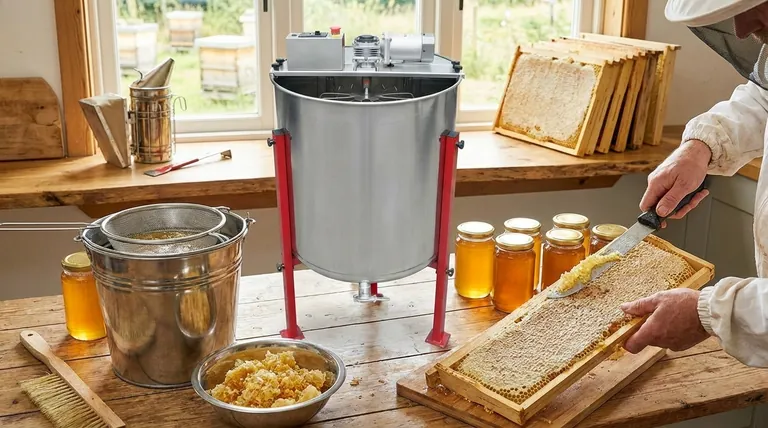
The Two Core Harvesting Methods
The method you choose directly impacts your bees. Bees expend significant energy and resources (consuming about 8 pounds of honey) to produce just one pound of wax. Preserving their comb is a major factor in the hive's efficiency.
The Crush and Strain Method (Simple & Low-Cost)
This is the most straightforward technique, requiring minimal specialized equipment. It is the standard method for top-bar hives or for beekeepers on a strict budget.
The process involves cutting the honeycomb out of the frame, crushing it by hand or with a tool, and placing the crushed mixture into a strainer or cheesecloth set over a bucket. Gravity does the work, allowing the honey to slowly drip through while the wax remains behind.
The Extraction Method (Efficient & Reusable Comb)
This method is standard for beekeepers using Langstroth hives with removable frames. While it requires an upfront investment in an extractor, it preserves the intricate wax comb.
After the frames are removed from the hive, a thin layer of wax capping is sliced off each cell using a hot knife or an uncapping knife. The frames are then placed inside an extractor, a machine that spins them at high speed. Centrifugal force flings the honey out of the cells and onto the walls of the extractor, where it drains to the bottom for collection.
A Step-by-Step Harvesting Guide
Regardless of the method, the overall workflow follows a clear sequence.
Step 1: Know When to Harvest
Only harvest frames from the super—the boxes stacked on top of the main brood chamber. You are looking for frames where the honey is "capped," meaning the bees have sealed the hexagonal cells with a fresh layer of white wax. This indicates the honey has been dehydrated to the correct moisture content and is ready for storage.
Step 2: Remove Bees from the Honey Frames
You must clear the bees from the frames you intend to harvest. The simplest way for a home beekeeper is to take one frame out at a time and use a bee brush to gently sweep the bees back into the hive. Alternatively, a bee escape board can be inserted a day before harvest, creating a one-way exit that clears the super of most bees.
Step 3: Separate Honey from the Wax
This is the key step where you perform either the crush and strain or the extraction method detailed above. If extracting, this is when you uncap the frames and spin them. If crushing, this is when you cut the comb from the frames and mash it.
Step 4: Strain and Bottle Your Raw Honey
No matter which method you use, the collected honey will contain small particles of wax or other hive debris. Pour the honey through a fine mesh strainer or multiple layers of cheesecloth to produce a clear, clean final product before bottling it in sterilized jars.
Step 5: Return Resources to the Hive
Do not discard the resources your bees worked hard to create. If you used an extractor, the "wet" frames should be returned to the hive. The bees will quickly clean up the remaining honey and repair and reuse the valuable comb. If you used the crush and strain method, the leftover wax can be melted down and used for candles or crafts.
Understanding the Trade-offs
Choosing a method is not just about convenience; it's about managing your apiary's resources.
Crush and Strain: Pros and Cons
The primary advantage is its extremely low cost and simplicity. You don't need any expensive machinery.
The significant disadvantage is that it destroys the honeycomb. The bees must work to completely rebuild it, consuming a large amount of their own honey stores and energy that could have gone toward making a surplus for the next harvest.
Extraction: Pros and Cons
The main benefit is the preservation of the drawn-out comb. By returning the intact frames to the hive, you give your bees a massive head start on the next honey flow, often leading to much higher yields over time.
The obvious downside is the cost and storage space required for an extractor. For a beekeeper with only one or two hives, this can be a prohibitive expense.
Making the Right Choice for Your Apiary
Your harvesting strategy should align directly with your goals and equipment.
- If you are a new beekeeper with a top-bar hive or a tight budget: Start with the crush and strain method, as it requires no specialized tools beyond a bucket and a strainer.
- If you have a Langstroth hive and aim for long-term efficiency: Invest in an extractor to preserve your bees' wax comb and maximize future honey yields.
- If you simply want to enjoy whole honeycomb: You can skip these methods entirely and simply cut a piece of capped comb directly from a frame to eat as is.
Ultimately, harvesting honey is the rewarding culmination of a season of careful stewardship.
Summary Table:
| Method | Best For | Key Equipment | Main Advantage |
|---|---|---|---|
| Crush & Strain | Top-bar hives, beginners, tight budgets | Knife, bucket, strainer | Low cost and simplicity |
| Extraction | Langstroth hives, long-term efficiency | Uncapping knife, extractor | Preserves wax comb for higher future yields |
Ready to harvest your honey efficiently? The right equipment makes all the difference. HONESTBEE supplies commercial apiaries and distributors with the durable, high-quality beekeeping supplies needed for a successful harvest—from extractors and uncapping knives to strainers and bottling buckets. Let us help you equip your apiary for maximum yield. Contact our wholesale experts today to discuss your needs!
Visual Guide
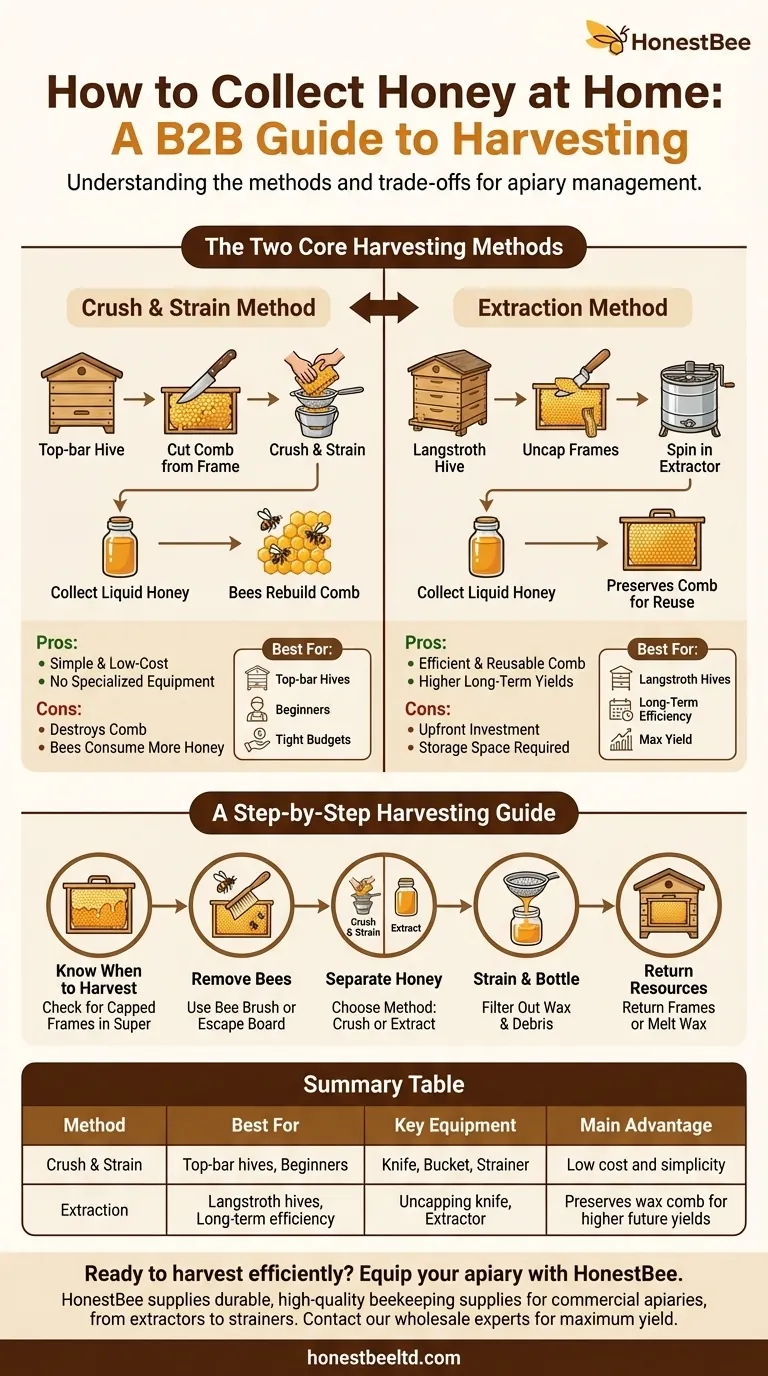
Related Products
- Electric 8 Frame Honey Spinner Extractor Equipment for Beekeeping
- HONESTBEE 3-Frame Manual Acrylic Honey Extractor
- HONESTBEE 72 Frame Industrial Electric Honey Extractor for Beekeeping
- electric honey extractor honey centrifuge 3 frame honey extractor stainless steel honey frame extractor
- Stainless Steel 3 Frame Manual Honey Extractor Spinner for Bee Honey Extraction
People Also Ask
- What machines are needed in beekeeping besides basic tools? Scale Your Honey Harvest Efficiently
- What is the purpose of decanting in honey extraction? Achieve a Purer, More Stable Honey Product
- What are the differences between manual and electric honey extractors? A Beekeeper's Guide to Power, Speed & Cost
- What equipment is used for honey harvest? Essential Tools for Every Beekeeper
- What should be considered when using a honey extractor to avoid damage? Ensure a Smooth, Efficient Harvest








